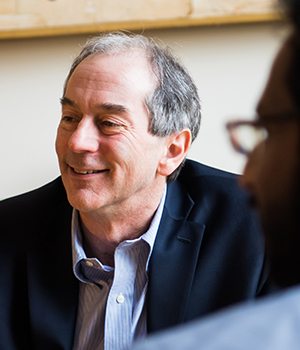
John Lienhard
(he/him)
Mechanical Engineering
Affirming students
Professor John Lienhard makes the members of his lab feel secure in their positions–and they are happier for it, according to his graduate students. During his time at MIT, Lienhard has supervised more than 85 graduate students and postdoctoral researchers in the Department of Mechanical Engineering. As a result of his exceptional efforts as a mentor, he was nominated and selected for the “Committed to Caring (C2C)” honor.
In addition to fostering excellent advising practices, much of Lienhard’s research is “centered around those most in need,” specifically those vulnerable to water and food scarcity around the world. As director of the Abdul Latif Jameel Water and Food Systems Lab, Lienhard works with his team to solve some of the most pressing environmental issues today, such as combating rising water stress (when demand for water is higher than its supply) through the desalination of seawater and brackish water, the remediation of various waste waters, and the recycling of water.
Support and Affirmation
The ability to demonstrate support and affirmation for his students has become a distinguishing feature of Lienhard’s success in mentoring. “Prof. Lienhard wrote me a kind email, gave me good comments for the things that were working well and encouraged me on the projects that were going behind schedule,” one student wrote. “His kindness helped me work harder and more effectively.”
Lienhard says his mentorship style is inspired by his own time in graduate school. Professor Anthony F. Mills at the University of California-Los Angeles was always willing to spend extra time to discuss course material, Lienhard recalls. The confidence that Mills demonstrated in Lienhard’s abilities “served as an anchor” in the challenging environment of graduate school.
As witnessed by the detailed nomination letters submitted to the C2C program, Lienhard emulates these practices today as a graduate advisor at MIT. One student wrote that Lienhard treats his students as individuals and provides each of them the unique support they need.
When Lienhard’s students encounter an unforeseen obstacle, Lienhard offers perspective to encourage moving forward. “When I received a rejection notice from a journal,” one nominator wrote, “[Lienhard] took the time to reassure me that this happens…and that based on the reviewer’s comments, the value of the paper was still strong.”
Some of Lienhard’s students have developed their own excellent mentorship practices. “As a mentor of undergrads myself,” one nominator wrote, “I followed John’s example in providing a warm and caring environment.” As a result, this student was honored with an Outstanding UROP Mentor Award.
Informal Advising
Lienhard also provides his students with professional advice beyond academic research. “He gave me advice and encouragement in all of my endeavors,” one nominator noted, “whether or not they adhered to the traditional academic path.”
He also practices informal advising (a Mentoring Guidepost identified by the C2C program). In group meetings, he initiates discussions of many relevant topics for graduate students beyond academia including the importance of exercise, preparing for a career, and managing finances. Lienhard also emphasizes to his graduate students “the need to communicate ideas, through presentations and other interpersonal interactions.” Before her first academic conference, one student recalled how she did not know how women were supposed to dress for academic conferences. The only female researcher in the group at that time, she turned to Lienhard for advice. The student recalls, “Lienhard said he wasn’t sure, but he thought to pull up a group photo from the last conference he attended so I could look at what the women were wearing!”
